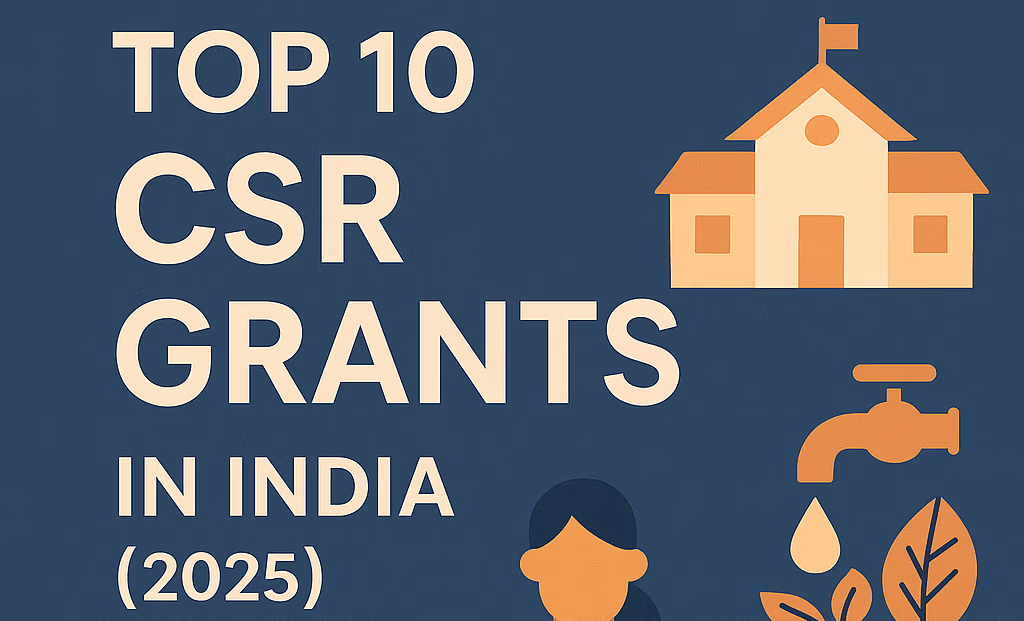Top 10 CSR Grants in India (2025)

Table of content
India’s CSR landscape in 2025 is expanding rapidly. From PSU giants like ONGC and SBI Foundation to tech leaders like Infosys Foundation and HCLTech, CSR allocations are opening structured grant windows for NGOs, startups, and institutions.
But compliance rules have tightened:
- As of 14 July 2025, CSR-1 filing is fully digital (web-only) (India Briefing).
- NGOs must hold valid 12A / 10(23C) / 80G registrations to qualify.
- CSR-1 requires professional certification by a CA, CS, or Cost Accountant .
- Stricter due diligence applies: multi-year audits, utilization certificates, and UDIN authentication.
- Impact assessments are now mandatory for projects ≥ ₹1 crore and for companies with CSR spend ≥ ₹10 crore.
Don’t forget: Before chasing grants, ensure your NGO’s CSR-1 and CSR-2 compliance is updated.
Next, let’s look at the Top 10 CSR grants in India (2025)—who can apply, how much funding is available, and verified official sources.
Tips to get CSR Grants approved faster
Each program is listed with funding size, focus, and last verified status.
1) HCLTech Grant 2025, ₹5 Cr (last verified August 2025)
- Focus areas: Education, Healthcare, Environment (Water, Biodiversity, Climate Resilience).
- Funding:
- ₹5 crore each to one winning NGO in every category.
- ₹25–50 lakh each to two runners-up per category.
- Total annual commitment ~₹15 crore.
- ₹5 crore each to one winning NGO in every category.
- Eligibility (as per HCL Foundation)
- Registered NGO (Society, Trust, or Section 8 Company) in India.
- Minimum 5 years of existence.
- At least 3 years of audited financials.
- Registered NGO (Society, Trust, or Section 8 Company) in India.
- Selection process:
- Multi-stage including online application, detailed proposal review, field visits, and jury evaluation.
- Multi-stage including online application, detailed proposal review, field visits, and jury evaluation.
- Impact so far: Since inception, the HCLTech Grant has committed ₹135+ crore to NGOs across 24 states, directly benefiting communities in education, health, and environment.
- Source & Apply: HCL Foundation – HCL Grant (official site).
2) HDFC Bank Parivartan SmartUp Grants — up to ₹50 lakh (last verified August 2025)
- Focus areas: Environment, healthcare, financial inclusion, and skill development, especially through social impact startups.
- Funding: Up to ₹50 lakh per startup, usually disbursed through incubator and accelerator partners.
- Eligibility:
- Registered startup with a social impact focus.
- Selection and funding are often routed via partner incubators recognized under Startup India.
- Registered startup with a social impact focus.
- Impact: Since its launch, the Parivartan SmartUp programme has supported hundreds of early-stage startups in renewable energy, health-tech, ed-tech, and financial inclusion.
- Source & Apply: HDFC Bank Parivartan (official CSR page).
See how to measure ROI of CSR infrastructure projects
3) Infosys Foundation Aarohan Social Innovation Awards — up to ₹50 lakh (last verified July 2025)
- Focus areas: Education, Healthcare, Rural Development, Women Empowerment, and Environmental Sustainability, with emphasis on tech-enabled social innovations.
- Funding: Up to ₹50 lakh per winner; total prize pool in 2025 is around ₹2 crore.
- Eligibility:
- Open to individuals, NGOs, and social enterprises.
- Applicants must present a working prototype or demonstrable innovation (concept notes are not accepted).
- Open to individuals, NGOs, and social enterprises.
- Selection process: Multi-stage evaluation including application review, prototype assessment, and final jury panel.
- Impact: Past awardees have scaled innovations in low-cost healthcare devices, rural education technologies, and sustainable farming.
- Source & Apply: Infosys Foundation – Aarohan Awards (official site).
4) Reliance Foundation Scholarships — UG & PG (2025–26 live, last verified August 2025)
- Focus areas: Higher education in STEM (Science, Technology, Engineering, Mathematics) and leadership.
- Funding:
- Undergraduate (UG): Up to ₹2 lakh over the duration of the course.
- Postgraduate (PG): Up to ₹6 lakh for the course duration.
- Undergraduate (UG): Up to ₹2 lakh over the duration of the course.
- Eligibility:
- Indian students enrolled in UG or PG programs in eligible streams.
- Selection based on merit-cum-means criteria, including academic performance and financial need.
- Indian students enrolled in UG or PG programs in eligible streams.
- Impact: Each year, thousands of students are supported under this scholarship, making it one of India’s largest private-sector education initiatives.
- Source & Apply: Reliance Foundation Scholarships (official site).
Download the free template of CSR proposal 2025
5) SBI Foundation Platinum Jubilee Asha Scholarships — ₹90 Cr (FY25–26, last verified June 2025)
- Focus areas: Education support for underprivileged students across India.
- Funding: ₹90 crore outlay for FY25–26, expected to cover 23,000+ students.
- Eligibility:
- Students from economically weaker backgrounds.
- Details and application process published on the SBI Foundation’s scholarship portal.
- Students from economically weaker backgrounds.
- Impact: Aims to expand access to quality education and reduce dropout rates among disadvantaged youth.
- Source & Apply: SBI Foundation Scholarships (official site).
6) ONGC CSR Grants & Scholarships (2025, last verified August 2025)
- Focus areas: Healthcare, education, skill development, environment, and rural infrastructure.
- Funding:
- CSR Project Grants: NGOs and institutions can apply for support in eligible focus areas.
- Scholarships: ONGC offers national-level scholarships for meritorious students, including those from SC/ST, OBC, and economically weaker backgrounds.
- CSR Project Grants: NGOs and institutions can apply for support in eligible focus areas.
- Eligibility (CSR Projects):
- NGOs must be registered and compliant with CSR-1.
- At least 3 years of audited financial statements.
- Alignment with Schedule VII of the Companies Act.
- NGOs must be registered and compliant with CSR-1.
- Compliance:
- Project implementing agencies must provide utilization certificates (FUC) certified by a Chartered Accountant, with UDIN (Unique Document Identification Number) as per MCA requirements.
- Project implementing agencies must provide utilization certificates (FUC) certified by a Chartered Accountant, with UDIN (Unique Document Identification Number) as per MCA requirements.
- Source & Apply: ONGC CSR Initiatives (official site).
7) Tata Steel Foundation Samvaad Fellowship 2025 (deadline: Aug 31, 2025, last verified July 2025)
- Focus areas: Tribal identity, culture, governance, livelihoods, and indigenous knowledge systems.
- Funding: Fellowship includes a stipend and institutional support to pursue community-led projects
- Eligibility:
- Open to tribal youth, leaders, researchers, and community-based organizations.
- Applicants must submit project proposals aligned with fellowship themes.
- Open to tribal youth, leaders, researchers, and community-based organizations.
- Impact: Samvaad, started in 2014, has grown into a pan-India tribal leadership initiative, supporting fellows who work on grassroots solutions in healthcare, governance, and cultural preservation.
- Source & Apply: Tata Steel Foundation – Samvaad Fellowship (official site).
8) Axis Bank Foundation Partnerships (2025, last verified August 2025)
- Focus areas: Sustainable rural livelihoods, women’s empowerment, and financial inclusion.
- Goal: Support 2 million households by 2025 through long-term NGO collaborations.
- Funding: Multi-year partnerships with NGOs working in agriculture, skill development, and community institutions.
- Eligibility:
- Registered NGOs with proven grassroots presence.
- Alignment with ABF’s focus on rural development and livelihoods.
- Registered NGOs with proven grassroots presence.
- Impact: Axis Bank Foundation works with over 100 NGO partners across India to strengthen community resilience and financial empowerment.
- Source & Apply: Axis Bank Foundation (official site).
Learn the right way to pitch your csr proposal
9) Cisco India Cash Grants (open 2025, last verified August 2025)
- Focus areas: Education, healthcare, economic empowerment, and crisis response, with emphasis on technology-enabled solutions.
- Funding: CSR cash grants awarded to NGOs with scalable projects in India.
- Eligibility:
- Registered non-profits with projects aligned to Cisco’s priority areas.
- Strong preference for organizations leveraging technology for impact.
- Registered non-profits with projects aligned to Cisco’s priority areas.
- Impact: Cisco India has supported initiatives in digital education access, healthcare delivery, and skilling for youth and women.
- Source & Apply: Cisco India CSR – Cash Grants (official site).
10) NFI Bandhutva CSO Resilience Grants (2025 call, last verified July 2025)
- Focus areas: Social justice, equity, and resilience, especially in Central, Eastern, and North-Eastern India.
- Funding: ₹8–10 lakh per CSO annually, for up to 3 years (renewable based on performance).
- Eligibility:
- Community-based organizations and grassroots CSOs.
- Focus on strengthening institutions, leadership, and rights-based approaches.
- Community-based organizations and grassroots CSOs.
- Impact: Supports smaller organizations in under-served regions to sustain their work and build resilience amid funding and operational challenges.
- Source & Apply: National Foundation for India – Bandhutva Grants (official site).
Applying for CSR grants in 2025 requires strategic alignment, compliance readiness, and outcome-driven proposals. Here’s what funders are prioritizing this year:
1. Align with CSR focus themes
Each corporate has defined focus areas under Schedule VII of the Companies Act. Study these before applying:
- HCLTech Grant: Education, Healthcare, Environment (Water & Biodiversity)
- Axis Bank Foundation: Sustainable Livelihoods & Women’s Empowerment
- Cisco Cash Grants: Technology-led Education & Healthcare
Tip: Use the same language as the funder’s CSR policy to show alignment.
2. Strengthen compliance and governance
- Ensure your CSR-1 is updated (mandatory since 14 July 2025).
- Hold valid 12A / 10(23C) / 80G registrations — without these, corporates cannot fund you.
- Provide 3 years of audited accounts and UDIN-certified utilization reports (required by many PSUs).
Note: For projects ≥ ₹1 crore, you must plan for third-party impact assessments.
3. Lead with measurable, time-bound outcomes
Funders value quantifiable results, not just activities.
- Weak: “We will skill rural women.”
- Strong: “We will train 1,200 rural women, of which at least 70% will secure jobs with an average income of ₹9,000/month within 6 months.”
Include KPIs, baselines, and monitoring & evaluation (M&E) systems in your proposal.
4. Show scalability and replicability
Corporates prefer models that can grow beyond a pilot. Demonstrate:
- How your project can be replicated in other geographies.
- Potential to reach more beneficiaries with additional CSR funding.
5. Focus on underfunded geographies
Regions like the North-East, tribal belts, and rural central India attract fewer CSR funds but are government priorities. Proposals that address these regions often stand out.
Include affordable sustainability in your next infrastructure project
6. Build partnerships for credibility
- Partner with incubators/accelerators (for startup-focused grants like HDFC Parivartan).
- Collaborate with academic institutions or government departments to strengthen delivery.
- Show existing partnerships in your application to boost trust.
7. Budget clarity and cost-effectiveness
CSR reviewers often reject proposals with vague or inflated budgets. Provide:
- Line-item budgets linked to outcomes.
- Evidence of cost-efficiency compared to peers.
Top 10 CSR Doners in Education Sector in 2025
Q1. Can NGOs without 12A/80G apply for CSR funds in 2025?
No. As per new CSR-1 rules (July 2025), NGOs must hold 12A/10(23C)/80G registrations to be eligible.
Q2. Are scholarships counted under CSR spend?
Yes. Reliance & SBI scholarships are funded from CSR allocations and qualify under Schedule VII.
Q3. Do all CSR projects need impact assessments?
No. Only projects ≥ ₹1 crore and companies with CSR spend ≥ ₹10 crore need third-party assessments.
2025 is a landmark year for CSR in India. With stricter CSR-1 compliance, mandatory impact assessments, and rising corporate allocations, NGOs and social enterprises that are well-prepared and compliant stand the best chance to secure transformational funding.
At BuiltX Sustainable Design & Construction, we specialize in helping nonprofits and institutions translate bold ideas into infrastructure-ready CSR projects — from hospital construction in Delhi NCR to school and rural housing projects across Assam, Bihar, and Maharashtra.
If you’re an NGO or social enterprise in India working in education, healthcare, or sustainable infrastructure. Contact BuiltX today to get started.
